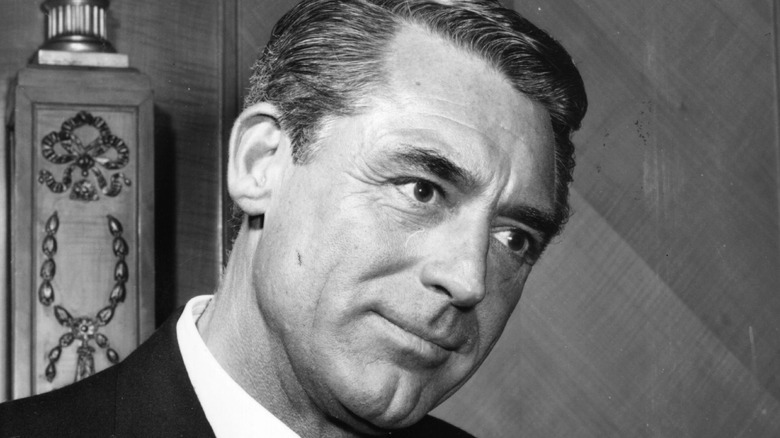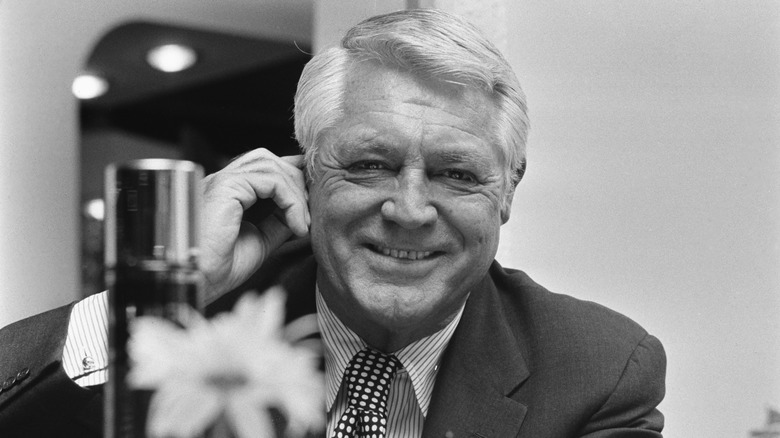What Cary Grant Had To Say About Rumors He Was Cheap
Old Hollywood wasn't a place known for safeguarding its stars' personal lives; in fact, the whole American movie industry of the day might be considered an enormous gossip mill. Even in the early days of cinema, salacious stories circulated about everyone from Greta Garbo to Mary Pickford, passed from person to person before finally landing in the newspapers and potentially derailing the careers of the very stars they otherwise celebrated. The sheer number of tidbits of Hollywood gossip could fill multiple books (and have), increasing the profile of long-dead stars whose names live on in both their movies and in debates over their private lives and the kinds of people they actually were.
Take, for instance, Cary Grant, for many the ultimate suave leading man of the silver screen, whose performances in classic movies such as Alfred Hitchcock's "North By Northwest" (1959) are still enjoyed by audiences today. During his lifetime, cracks appeared in his otherwise immaculate persona, in the form of rumors that suggested he was the cheapest actor in Tinseltown. According to a recently unearthed memoir written by his one-time friend, the Australian costume designer Orry-Kelly — with whom he used to share an apartment before he was rich and famous — Grant retroactively billed his former roommate to the tune of $360.48 for various bills he had picked up when the two were unknowns, despite his immense Hollywood wealth (via National Enquirer). That example surfaced in 2016, so why for half a century has Grant's reputation as a cheapskate preceded him?
Cary Grant: a business-minded star
One of the most celebrated and well-compensated actors of his day, Cary Grant also became known as one of Hollywood's most penny-pinching. It was a characterization Grant resented, according to a 1977 profile in The New York Times. As Grant discusses, it was even suggested that he was so cheap as to keep buttons off old shirts, though Grant claims he used them as replacements on other garments, with the old shirts becoming cleaning cloths for his housekeeper.
Arguing that he wasn't cheap, Grant stated: "Well, you could start by looking at my charity donations. Now, perhaps I've offended some people I wouldn't loan money to; they tend to be voluble. It's true I don't lead the life of a Frank Sinatra. But someone should ask the door men and waiters I deal with. I pay my bills immediately, and a lot of big spenders don't. The fact that I have been reported to have so much money doesn't help either."
Early rumors that Grant was a skinflint may in fact be the result of sour grapes on the part of the studio executives for whom Grant worked. According to the same source, Grant is considered the first actor to argue his way out of exclusivity for one studio, while he also pioneered a form of contract in which actors would be paid a percentage of the total gross a movie makes at the box office. "I was never interested in acting in films; I was interested in the economics of the business," Grant said. Is it possible Grant's negotiating power may have underpinned his reputation for cheapness?
Cary Grant's frugal upbringing
While Cary Grant refuted claims that he was actively cheap, he certainly considered himself more frugal in terms of his lifestyle than other stars of the period, and the reason for this aspect of his character may be best understood by looking at the circumstances of his childhood.
As his biographer Geoffrey Wansell claims in his book "Haunted Idol: The Story of the Real Cary Grant," Grant's childhood in Bristol, England, had been dominated by financial hardship. His father, Elias, was a factory worker, but Grant's mother, Elsie, was dissatisfied with the money he made, and the two continually argued about money in front of their son. Elsie frequently instilled into the young boy that his father wasn't "made of money," and stressed the need for frugality almost as a survival mode.
Wansell believes that such interactions as well as the atmosphere of despair created by the family's finances is what led Grant to become such a frugal adult; that for Grant, being poor necessarily meant domestic unhappiness, that subconsciously the financial constraints he imposed on himself were a way of ensuring he didn't end up as blatantly unhappy as his own parents.


